Podcast Topic: Food Safety & Food Defense
The Leading Voices in Food
Podcast Topic: Food Safety & Food Defense
 E229: From label to table: Regulating food in America
E229: From label to table: Regulating food in America
February 14, 2024
How did the Nutrition Facts label come to appear on millions of food products in the U.S.? As Auburn University historian, Xaq Frohlich, reveals in his new book, “From Label to Table: Regulating Food in America in the Information Age,” these seemingly innocuous strips of information reveal the high stakes politics that can help determine what we eat and why. In today’s podcast, Frohlich will explore popular ideas about food, diet, and responsibility for health that have influenced what goes on the Nutrition Facts panel and who gets to decide that.
Related podcasts: Food Industry Behavior & Marketing | Food Policy | Food Safety & Food Defense | History & Food |
 E225: Efficient Food Recovery and Waste Prevention – a Business Strategy
E225: Efficient Food Recovery and Waste Prevention – a Business Strategy
January 17, 2024
Our guest today is Jasmine Crowe-Houston, social entrepreneur, and founder of Goodr.co. Jasmine started her journey cooking soul food for hungry unhoused people in her kitchen in her one-bedroom apartment in Atlanta. She fed upwards of 500 people a week for years with pop-up kitchens and parks and parking lots. Then in 2017, she founded Goodr, a technology-based food waste management company that connects firms with food surpluses to nonprofit organizations that can use the food. She has worked with organizations that have food waste issues, such as the Atlanta International Airport, Hormel Foods, and Turner Broadcasting. Today, Goodr has expanded nationwide and sponsors free grocery stores and schools. She has combined charity, innovation, and market-based solutions into a for-profit waste management company that Inc. Magazine called a rare triple win.
Related podcasts: Climate Change, Environment & Food | Equity, Race & Food Justice | Food Banks, Food Pantries & Soup Kitchens | Food Insecurity | Food Safety & Food Defense | Food Waste & Implications |
 E223: Food Policy Lessons from Removing Trans Fats from our Diet
E223: Food Policy Lessons from Removing Trans Fats from our Diet
December 20, 2023
In August of 2023, the Food and Drug Administration issued something known as a direct final rule, disregarded trans fats in the food supply. Consumers won’t notice changes as the rule just finalizes FDA’s 2015 ruling that partially hydrogenated oils – trans fats – no longer had “GRAS status.” GRAS stands for generally regarded as safe. We cover this issue today because this trans fat ban was the product of lots of work by a key group of scientists, the advocacy community, and others. The anatomy of this process can teach us a lot about harnessing scientific discovery for social and policy change. At the center of all this is today’s guest, Dr. Walter Willett. Walter Willett is one of the world’s leading nutrition researchers. He is professor of epidemiology and nutrition at the Harvard T.H. Chan School of Public Health, and for many years served as chair of its Department of Nutrition. He’s published extensively, been elected to the National Academy of Medicine, and it turns out, is the world’s most cited nutrition researcher.
Related podcasts: Advocacy & Food | Diet & Nutrition | Food Industry Behavior & Marketing | Food Policy | Food Safety & Food Defense |
 E210: Clinical Trial Evidence: Metabolic Effect of Sweeteners
E210: Clinical Trial Evidence: Metabolic Effect of Sweeteners
July 24, 2023
Sugar replacements, known generally as artificial sweeteners or non-nutritive sweeteners, have been in the news a lot. Rising concerns exist about safety and the effects of the sweeteners on many key features of health, including the microbiome. We need the help of talented scientists to sort through this complex web of information. Today’s guest, Professor Eran Elinav, has done some of the seminal research in this area. He’s an expert on systems immunology at the Weizmann Institute of Science in Israel.
Related podcasts: Diet & Nutrition | Food Policy | Food Safety & Food Defense | Microbiome | Zero Calorie Sweeteners |
 E207: World Health Organization’s Recommendations on Non-Sugar Sweeteners
E207: World Health Organization’s Recommendations on Non-Sugar Sweeteners
June 28, 2023
Today’s podcast is a continuation of our series exploring the safety of non-sugar sweeteners in both food and beverages. In 2022, the World Health Organization conducted a systematic review of the most current scientific evidence on the health effects of non-sugar sweeteners. This analysis of 283 studies reveals that non-sugar sweeteners can impact health conditions such as cardiovascular disease, type 2 diabetes, adiposity, bladder cancer, and preterm birth. In 2023, the WHO released a guideline on the use of non-sugar sweeteners based on this 2022 review. Our guests today are Dr. Jason Montez, scientist with the World Health Organization, and technical lead on the systematic review and guideline. And, the director of the Department of Nutrition and Food Safety at the World Health Organization, Dr. Francesco Branca.
Related podcasts: Childhood Obesity | Diet & Nutrition | Food Policy | Food Safety & Food Defense | Microbiome | Obesity | Zero Calorie Sweeteners |
 E205: Here’s what sugar and zero-calorie sweeteners do to your body
E205: Here’s what sugar and zero-calorie sweeteners do to your body
May 17, 2023
Today we speak with an expert on sugar and things meant to replace it. The stakes are high. Very high. Sugar consumption in the population is astronomical and so is the use of sugar replacements. Knowing the impacts of both could help experts provide dietary guidance and help consumers make decisions. Dr. Robert Lustig is Professor Emeritus of Pediatrics in the Division of Endocrinology at the University of California, San Francisco. He specializes on the regulation of energy balance by the central nervous system; body weight regulation, appetite, metabolism, and is very well known for his work on sugar and their substitutes and on policies aimed at improving the diet of the population. A YouTube video on the effects of consuming sugar called “Sugar: The Bitter Truth,” has now been viewed 24 million times.
Related podcasts: Addiction & Food | Diet & Nutrition | Food Industry Behavior & Marketing | Food Safety & Food Defense | Microbiome | Zero Calorie Sweeteners |
 E204: The troubling unknowns of non-caloric sweeteners
E204: The troubling unknowns of non-caloric sweeteners
May 4, 2023
As a society, we are eating and drinking low-calorie sweeteners more and more. Researchers are working to understand the long-term impact of such sweeteners for adults and, of course, for children. This interview is part of a series on the impact of sweeteners. Our guest today is Dr. Allison Sylvetsky, Associate Professor in the Department of Exercise and Nutrition Sciences at the George Washington University – Milken Institute School of Public Health.
Related podcasts: Child Development & Nutrition | Diet & Nutrition | Food Safety & Food Defense | Microbiome | Ultra-processed Food & Additives | Zero Calorie Sweeteners |
 E202: Impact of non-caloric sweeteners on the microbiome – what we know now
E202: Impact of non-caloric sweeteners on the microbiome – what we know now
April 13, 2023
With the widespread presence of artificial sweeteners in the food system, scientists and consumers want to know about their safety. Safety concerns have been expressed for years, and lots of research has been done, but relatively new on the scene is work examining the effect of sweeteners on the microbiome. This interview is part of a series on the impact of artificial sweeteners. Our guest today, Dr. Jotham Suez, is doing fascinating work on this topic. He’s Assistant Professor of Molecular Microbiology and Immunology and the Public Health Johns Hopkins University.
Related podcasts: Diet & Nutrition | Food Safety & Food Defense | Microbiome | Zero Calorie Sweeteners |
 E196: Why do we need zero calorie sweeteners, and are they safe?
E196: Why do we need zero calorie sweeteners, and are they safe?
February 23, 2023
Artificial sweeteners, known more recently as non-nutritive or low-calorie sweeteners, have been a source of great hope. What could be better than enjoying sweetness in foods but without the calories? Sucralose, xylitol, stevia, saccharin, aspartame, there are a lot of them out there. You may add them to food yourself, you may consume them in beverages, and if not, there’s a good chance they’ll show up in foods that you buy. But, do they work and are they safe? Few know this area like Dr. Richard Mattes, distinguished Professor of Nutrition Science at Purdue University.
Related podcasts: Diet & Nutrition | Food Safety & Food Defense | Obesity | Zero Calorie Sweeteners |
 E194: Foodborne illness and the struggle for food safety
E194: Foodborne illness and the struggle for food safety
January 25, 2023
When I was growing up, people didn’t fret much about food safety. Trichinosis from undercooked pork was about all I heard about. But today people hear about much more: norovirus, salmonella, campylobacter, staphylococcus, listeria, and there’s much more. So what in the world is happening? Our guest, Timothy Lytton, distinguished university professor and professor of law at Georgia State University knows an awful lot about this. He’s the author of a seminal book entitled “Outbreak: Foodborne Illness and the Struggle for Food Safety.”
Related podcasts: Food Policy | Food Safety & Food Defense |

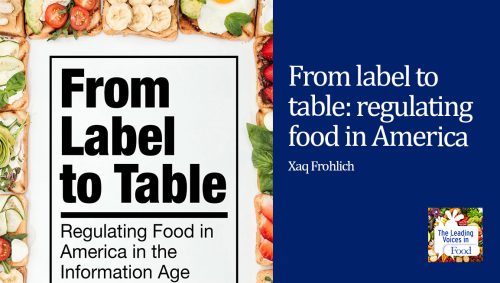 E229: From label to table: Regulating food in America
E229: From label to table: Regulating food in America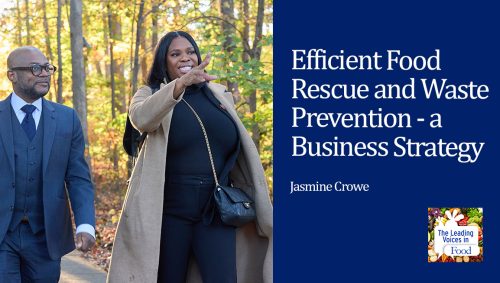 E225: Efficient Food Recovery and Waste Prevention – a Business Strategy
E225: Efficient Food Recovery and Waste Prevention – a Business Strategy E223: Food Policy Lessons from Removing Trans Fats from our Diet
E223: Food Policy Lessons from Removing Trans Fats from our Diet E210: Clinical Trial Evidence: Metabolic Effect of Sweeteners
E210: Clinical Trial Evidence: Metabolic Effect of Sweeteners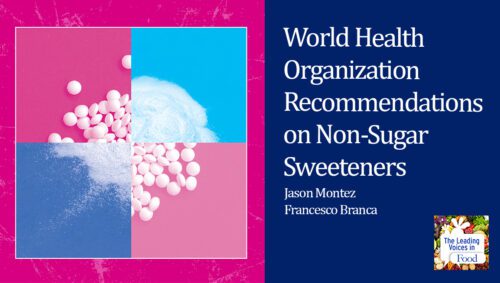 E207: World Health Organization’s Recommendations on Non-Sugar Sweeteners
E207: World Health Organization’s Recommendations on Non-Sugar Sweeteners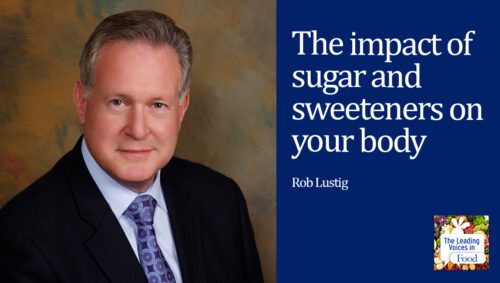 E205: Here’s what sugar and zero-calorie sweeteners do to your body
E205: Here’s what sugar and zero-calorie sweeteners do to your body E204: The troubling unknowns of non-caloric sweeteners
E204: The troubling unknowns of non-caloric sweeteners E202: Impact of non-caloric sweeteners on the microbiome – what we know now
E202: Impact of non-caloric sweeteners on the microbiome – what we know now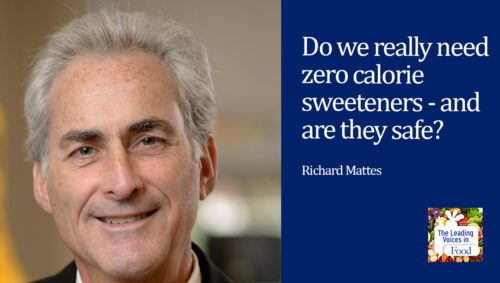 E196: Why do we need zero calorie sweeteners, and are they safe?
E196: Why do we need zero calorie sweeteners, and are they safe?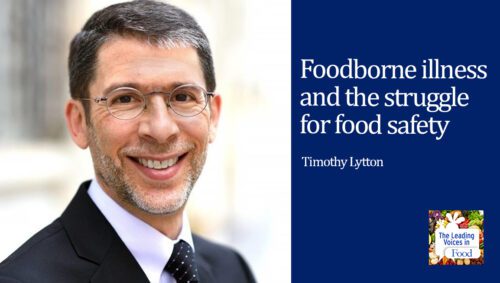 E194: Foodborne illness and the struggle for food safety
E194: Foodborne illness and the struggle for food safety